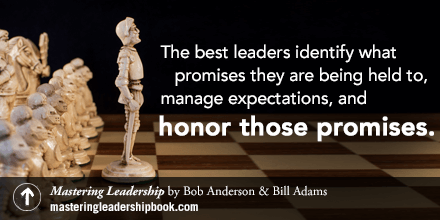 People expect things of you when you become a leader. “When we step into leadership, we may not be aware that it comes with implicit promises in the form of expectations,” says Bob Anderson, co-author of the recently published Mastering Leadership.
People expect things of you when you become a leader. “When we step into leadership, we may not be aware that it comes with implicit promises in the form of expectations,” says Bob Anderson, co-author of the recently published Mastering Leadership.
When I interviewed Anderson in advance of the book’s publication, he shared his perspective on a central theme of the book: there are “promises” inherent in every leadership relationship. Delivering on those promises is what makes a leader highly effective.
Here’s what Bob had to say about the theme of “promises” as it relates to leadership. (What follows is an edited and condensed version of our conversation.)
JM: Your book lays out Four Universal Promises of Leadership. Why did you and [co-author] Bill Adams choose the word “promise?”
BA: Your question got me to thinking about wordplay. “Promise” really means two things in the context of our book. The first is that when people step into leadership, it is like they are taking an oath that they’re going to do certain things. The promises they make are things like, “I promise to be effective . . . I promise to provide clear direction . . . I am going to provide value this to the organization . . . I promise to engage and create a highly engaged fulfilling culture” and so on. I think it is useful [for leaders] to think of it like, “I am taking an oath that I am going to do these things.” Whether it is explicitly stated or not.
JM: Do people freak out when you frame leadership as taking an “oath?”
BA: Not really. The reality is that if leaders don’t do these things, performance suffers. We hold our leaders to such a high level of expectation and accountability that in effect they are promises. So it’s like a sigh of relief when they hear us acknowledge that they took an “oath.” At some very deep level, they know these are the things leaders are called upon to do.
JM: And what’s the second element of the word “promises?”
BA: It has to do with fulfilling the “promise” of one’s profession. I like the notion of promise from the standpoint that we want to help develop real mastery in leadership, so that leadership can fulfill on the promise of their profession.
JM: In the book, you and Bill Adams make the case that people in leadership roles should look at it as a profession, like a CPA or a doctor.
BA: Right. For example, the promise of a profession as a doctor is a healer. A great doctor is a great healer and that is fulfilling the full promise of that profession. I would go a step farther than just “profession” as a job or role and say that leadership is a vocation.
Want to learn more about the book “Mastering Leadership?” Read my book review .
Disclosure: I received pre-publication copy of this book for review purposes. Some of the links in this post may be affiliate links, which means if you make a purchase, I receive a small commission. I only review materials that I think will be useful to my readers. Of course, you should draw your own conclusions and decide for yourself what is valuable.
Leave a Reply